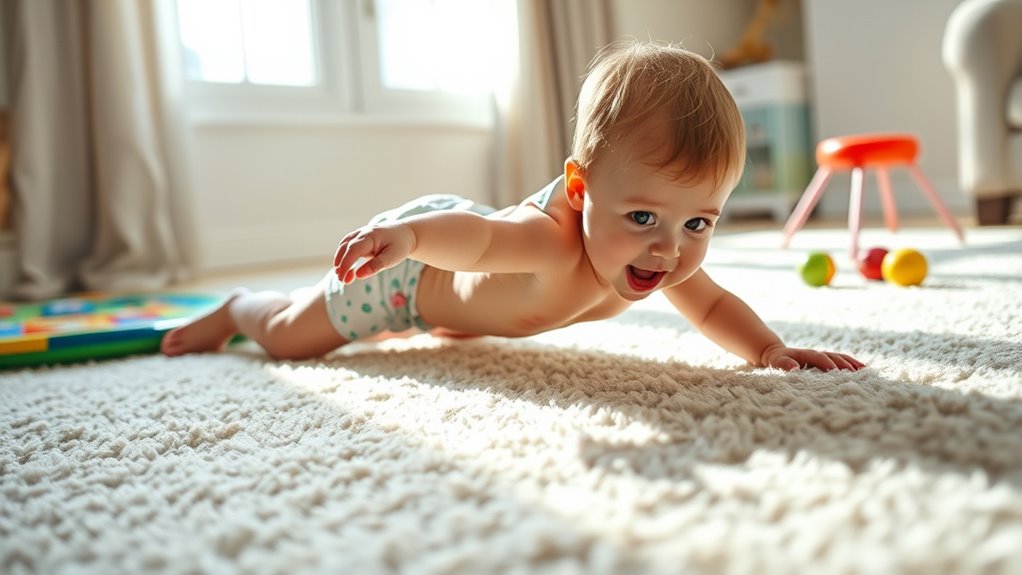To help your child develop gross motor skills from tummy time to running, start with tummy time to build core strength and coordination. As they crawl, they’ll refine muscle control and explore their environment. Standing and balancing prepare them to take first steps with confidence. With encouragement and practice, they’ll shift to walking and eventually running, improving coordination, confidence, and active exploration. Keep supporting each milestone, and you’ll see their skills grow—discover how each step shapes their progress.
Key Takeaways
- Tummy time develops foundational motor skills like neck strength and core stability, essential for crawling and walking.
- Crawling enhances sensory integration, hand-eye coordination, and muscle strength, preparing children for standing and walking.
- Standing exercises build leg strength and balance, encouraging confidence and stability necessary for taking first steps.
- Early walking fosters independence, sensory exploration, and muscle coordination, leading to smoother transition to running.
- Active play and refined motor skills, such as climbing and jumping, support the progression from walking to running.
Early Foundations: Tummy Time and Its Importance
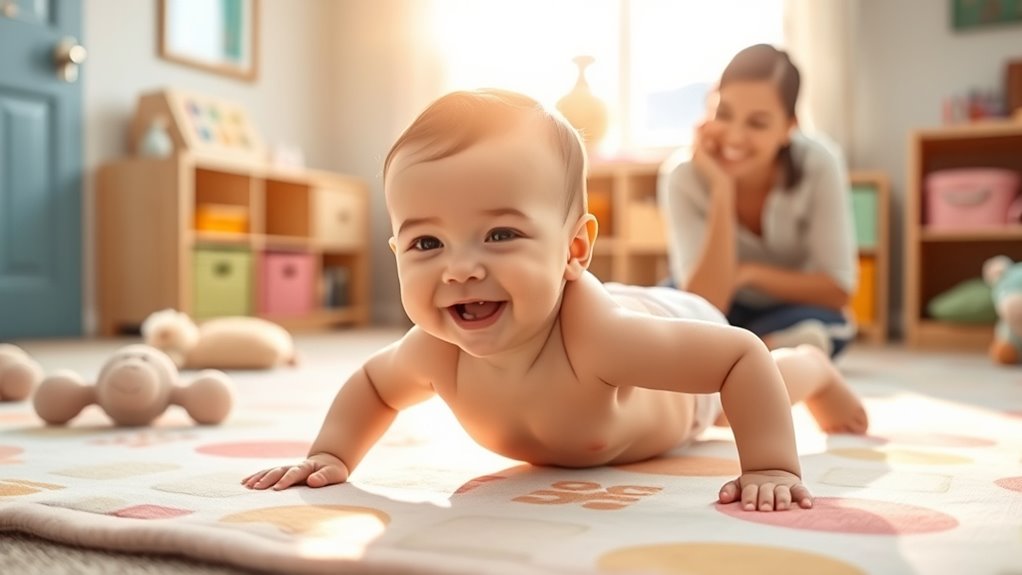
Tummy time is a critical activity that helps build a baby’s early motor skills by encouraging them to lift their head, strengthen neck muscles, and develop core stability. It plays an essential role in sensorimotor development, as babies explore their environment through movement and touch. During tummy time, your interactions with your baby foster important parent-child interaction, strengthening your bond while supporting their growth. By engaging with your baby during this activity, you help them become more aware of their body and surroundings, laying the groundwork for future milestones like rolling and crawling. Consistent tummy time not only boosts physical strength but also stimulates their senses, making it an indispensable part of their early development journey. Additionally, introducing proper positioning and support during tummy time can enhance comfort and effectiveness for your little one. Using appropriate baby equipment can further facilitate safe and enjoyable tummy time sessions.
Crawling Milestones and Building Strength
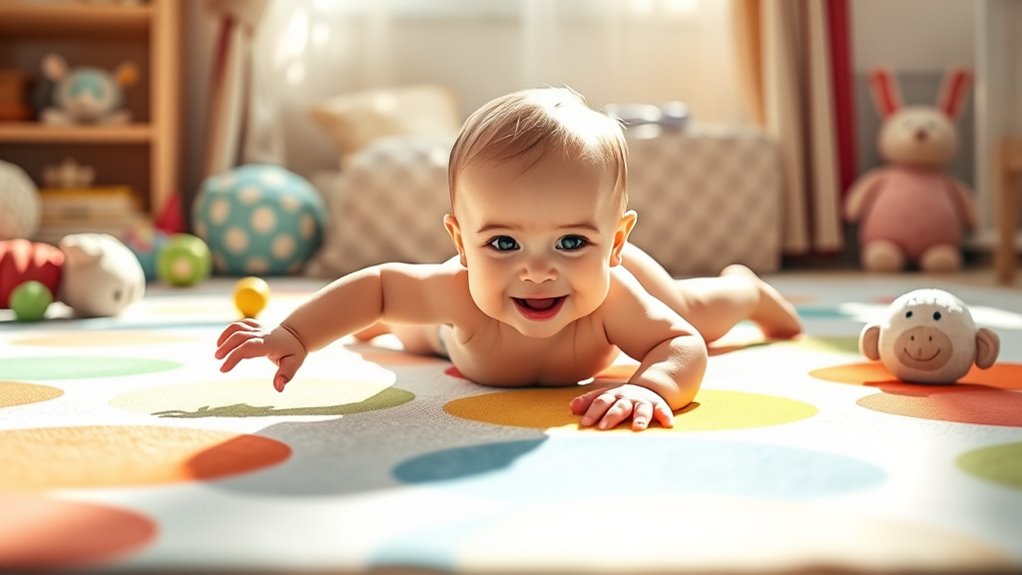
As your baby gains strength from tummy time, they start to explore new ways of moving that lead to crawling milestones. During this stage, they develop vital skills like sensory integration, which helps them interpret different sensations as they push forward. As they practice crawling, their hand-eye coordination improves, allowing them to reach for toys or objects with purpose. Building core strength is essential, so they can balance on hands and knees and coordinate movements smoothly. Encouraging your baby to explore their environment enhances their muscle development and coordination. Providing safe spaces to practice crawling will help them refine their skills, making each milestone a step closer to more advanced movements. Additionally, supporting their development through gross motor skills activities prepares them for future physical achievements. Developing muscle strength is a fundamental part of this process, as it directly influences their ability to perform these movements effectively. Engaging in motor skill development activities also promotes overall physical confidence, helping your child gain independence early on. This phase lays the foundation for their future gross motor achievements.
Standing and Balance: Preparing to Walk

Before your baby can take their first steps, they need to develop strong standing skills and good balance. You can encourage this by incorporating simple balance exercises, such as helping them stand while holding onto standing support like furniture or your hands. These activities help strengthen their leg muscles and improve stability. As they practice, their core muscles also get better, which is essential for maintaining upright posture. Incorporating muscle development techniques can also enhance their overall coordination and muscle control, making the transition to walking smoother. Additionally, engaging in play-based activities that promote balance can make the process more enjoyable and natural for your baby. Be patient and offer steady support to boost their confidence. Avoid rushing, and let them explore standing at their own pace. Consistent practice with support exercises and standing support prepares your baby physically, making the transition to walking smoother and more confident.
Taking First Steps and Developing Confidence
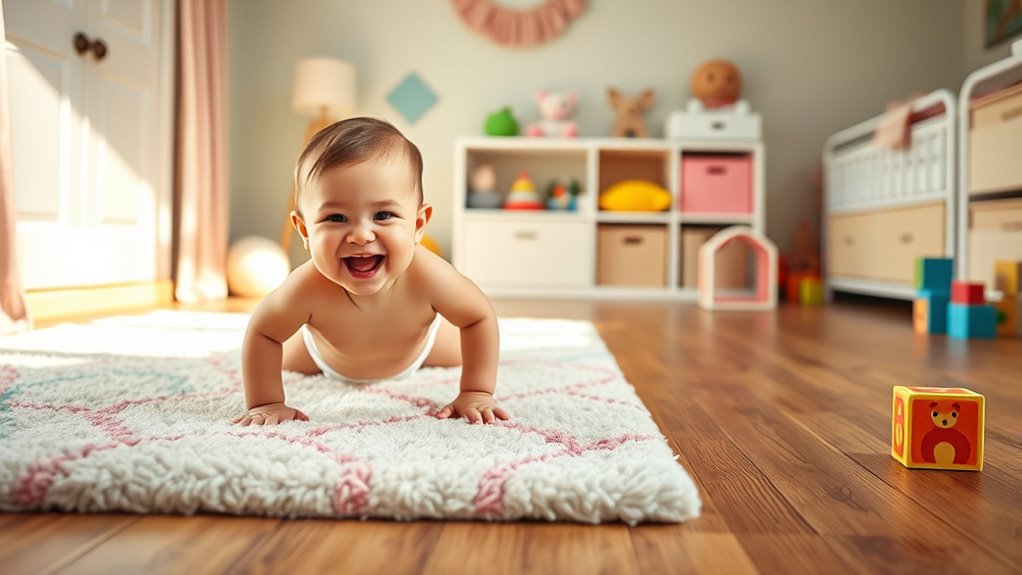
Once your baby begins to stand steadily and balance improves, they will naturally start to take their first steps. This moment is vital for confidence building, as each step encourages your little one to trust their abilities. During this phase, they engage in sensory exploration—feeling different textures and surfaces as they move. Supporting their efforts with encouragement and patience helps them feel secure and motivated to practice walking. You might notice them wobbling or pausing to steady themselves, which is a normal part of developing confidence. Celebrate these small successes, knowing that each step reinforces their growing independence. As they explore their environment, they learn about their limits and capabilities, laying the foundation for more confident, deliberate movement. Additionally, understanding gross motor skills can help you better support their development during this exciting time. Recognizing the importance of motor development milestones allows you to celebrate progress and identify areas where your child may need extra encouragement. Developing these skills also involves proper practice and patience, which are essential for steady progress in early mobility.
From Walking to Running: Refining Motor Skills
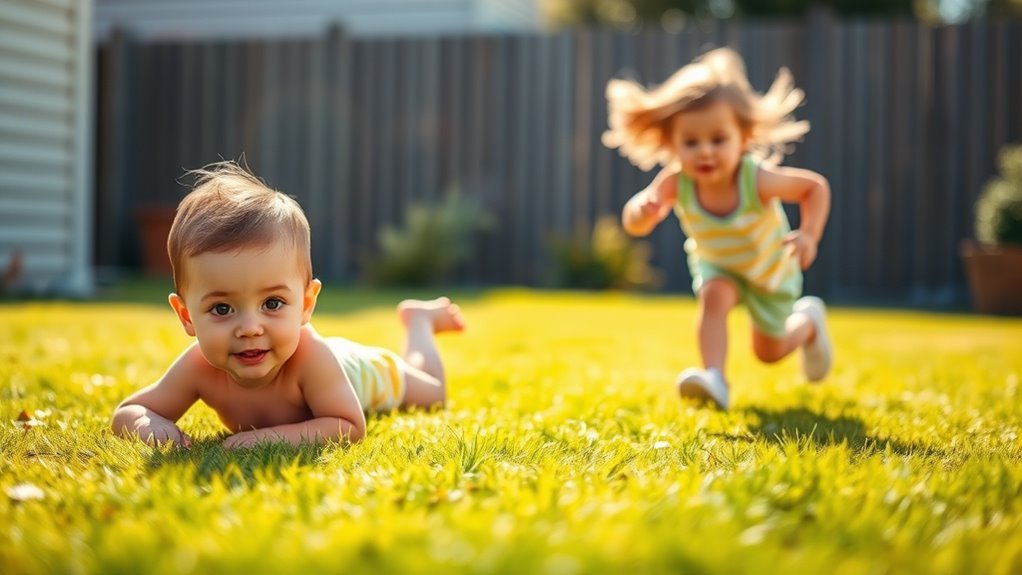
Moving from walking to running is an exciting milestone that sharpens your child’s motor skills and coordination. During this stage, sensory integration improves as your child learns to process visual, tactile, and proprioceptive inputs for better balance. Muscle coordination becomes more refined, allowing smoother, faster movements. To support this development, encourage activities like:
- Playing chase games to boost agility
- Climbing on playground equipment for strength
- Jumping over objects to improve balance
- Dancing to enhance rhythm and coordination
- Negotiating uneven surfaces to challenge sensory integration
These activities help your child fine-tune their motor skills, making running more effortless and controlled. As their sound design skills develop, they can even incorporate rhythmic patterns into their play, further enhancing coordination. Developing sensory processing skills is essential at this stage, as it helps children better interpret incoming stimuli for more coordinated movements. Incorporating motor skill exercises into daily routines can accelerate their progress and build confidence. With consistent practice, they’ll develop the muscle coordination and sensory processing needed for confident, efficient movement.
Frequently Asked Questions
How Can Parents Encourage Their Child’s Gross Motor Development at Home?
You can encourage your child’s gross motor development at home by providing plenty of safe, supervised play. Incorporate sensory activities like jumping in a ball pit or crawling through tunnels to build strength and coordination. Always prioritize playground safety, ensuring equipment is secure and surfaces are soft. Encourage outdoor activities like running and climbing to boost their skills, making sure they have fun while developing confidence and physical fitness.
What Are Common Signs of Delayed Motor Skill Development?
Missing motor milestones, like rolling over or walking by age 18 months, can signal developmental delays. You might notice your child struggles to sit unaided, lacks muscle tone, or avoids jumping and crawling. While some variation is normal, consistent delays in gross motor skills could indicate a need for evaluation. Keep observing your child’s progress, and consult a healthcare professional if you’re concerned about their motor development or signs of delays.
How Does Nutrition Impact Gross Motor Skill Progress?
Nutrition impact plays a crucial role in your child’s gross motor skill progress by supporting muscle strength, coordination, and energy levels. Proper intake of essential nutrients like protein, calcium, and vitamins helps your child reach dietary milestones that promote active movement. When your child’s diet is balanced, they’re more likely to develop skills like crawling, standing, and running on time, setting a strong foundation for overall motor development.
Are There Specific Activities to Support Coordination and Agility?
You can support coordination and agility by encouraging activities like balance exercises, which help develop stability, and obstacle courses, which challenge your child’s motor planning and problem-solving skills. These activities promote muscle control, spatial awareness, and confidence. Make sure to tailor challenges to their age and skill level, providing a fun environment that motivates them to improve their balance, agility, and overall gross motor coordination.
When Should Parents Seek Professional Advice for Motor Delays?
When your child isn’t meeting developmental milestones or seems to struggle with movement, it’s time to seek professional advice. Trust your instincts—if delays persist despite your support strategies, consult a pediatrician or specialist. Early guidance guarantees your child gets the help needed to develop gross motor skills, from tummy time to running, and supports their overall growth and confidence. Don’t wait—early intervention can make a big difference.
Conclusion
As you watch your child go from tummy time to running, it’s like witnessing a tiny seed grow into a strong tree—each stage building on the last. The gentle crawl becomes confident steps, and those steps turn into swift, joyful runs. Remember, every milestone is a stepping stone, shaping their strength and independence. Embrace each moment, knowing that today’s small progress is the foundation for tomorrow’s boundless adventures.
